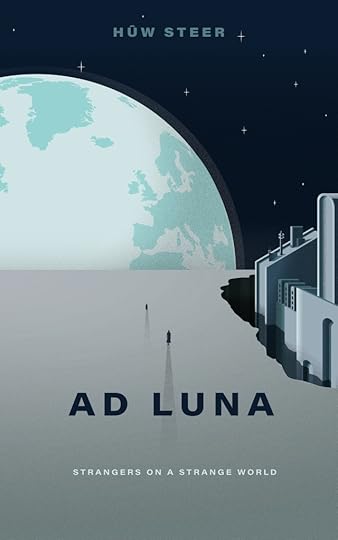What Is Sci-Fi, Anyway?
Different people have different opinions on what constitutes ‘real’ science-fiction. This is inherently absolutely fine – there are a lot of stories out there and they’re all going to hit differently. But what’s been rattling around my head for a while is that not all of these definitions are actually defining the same thing.
I should probably explain that.
Back when I wrote my dissertations on the history of sci-fi, I considered a few definitions of the genre before picking my favourite, which was coincidentally a definition that made Lucian’s True History count as science-fiction. Handy, given that if that wasn’t the case I wouldn’t have been able to write the essay. (Or Ad Luna.) Essentially the problem as I encountered it was this: does science fiction have to be about ‘science’? Brian Aldiss and David Wingrove thought so: their Trillion Year Spree cites Frankenstein as being “the first real novel of science fiction”[1] – anything earlier is “pure fantasy”.[2] This is the science-centric version: sci-fi that doesn’t rely on the progress of science, on some kind of critique of the progress of technology, isn’t sci-fi. It’s just… well, ‘fi’.
But I didn’t like this definition – it always seemed too narrow, too exclusive, and too focused on specific content than on theme. Darko Suvin’s definition – the idea of ‘cognitive estrangement’, of showing the reader a world that is in some way different and forces them to reflect on their own world – is more appealing. [3] This for me is what sci-fi is all about: tweaking something about the world and exploring all the changes and fallout from that tweak. What if we could build perfect humanoid robots that could be walking among us right now? Blade Runner. What if censorship went so far that we started burning all books? Fahrenheit 451. This definition makes sci-fi all about ‘what-ifs’, and that for me is far more important than the actual presence of ‘science’.
Just because your sci-fi story features some sort of future science doesn’t mean it’s really about that science. The other half of the debate is ‘hard’ versus ‘soft’ sci-fi; stories that hinge around the exact and factual mechanics of the Big Science Thing versus stories that don’t really care and would rather explore the world more generally instead.
But the thing is that neither of the above definitions has to be wrong… because they’re actually talking about slightly different things. Suvin’s ‘cognitive estrangement’ doesn’t just apply to stories that we’d consider sci-fi, after all. There are plenty of fantasy stories that do the same thing: present a world very similar to our own but with the addition of some novum – the Different Thing – that completely changes how the world works. The Temeraire books, for instance: they’re indisputably fantasy, but fundamentally they’re set in a recognisable 1800s world, just with the addition of dragons, and all the societal changes that entails. They’re not sci-fi – but they fit Suvin’s definition anyway.
 Is Ad Luna science-fiction? Some competition judges have said yes, some have said no. Definitions are weird.
Is Ad Luna science-fiction? Some competition judges have said yes, some have said no. Definitions are weird.And the True History, too. There is not a drop of science in Lucian’s satire, but it’s all about those novums – an enlightened Lunar society, but they’re all male! An island of trees, but alive! And all of these things reflect in some way on contemporary Greco-Roman society. So too Star Trek, the spiritual descendant of the True History: yes, it’s in space, yes, it’s dealing with representations of racism or Communism but through a distorted, fictional lens… but for all the technobabble and future tech, it’s not really about science, is it? It’s so fantastical as to be divorced from most modern understanding of technology and science. And you’d never say that Star Trek isn’t science-fiction.
So what am I getting at? Essentially, over the years, we as a literary society have managed to hopelessly overlap and confuse two linked but different genres: science-fiction, which is about reflecting and critiquing our world through some technological or scientific novum, and speculative fiction, which is about reflecting and critiquing our world through any kind of novum. When most people say ‘science fiction’ – including myself – what we actually mean is ‘speculative fiction’, the broader genre to which sci-fi belongs. Much fantasy is speculative fiction; pretty much all sci-fi is speculative fiction; and plenty of other stories which don’t quite feel right as either of the above can be speculative fiction too. It’s in the name: speculative fiction, speculating about how a world would change with those little twists and tweaks.
But because there’s so much science-fiction and because it’s the most obvious carrier of the spec-fic torch, the names and definitions have blurred. Basically all sci-fi is spec-fic, but not all spec-fic is sci-fi – there’s just so much sci-fi that it’s very easy to think of it as being the whole genre instead of just a part of it. And this is why the oft-repeated argument of ‘is this real sci-fi’ exists at all. Take Star Wars. Hardcore sci-fi fans, those who want the science to be hard, front and centre, of their stories, would say Star Wars isn’t sci-fi. But, cry legions of other fans, it’s in space and it’s full of lasers, FTL and robots: of course it’s sci-fi. The former are arguing about science fiction – the latter about speculative fiction. They’re both right – but they’re applying the same name to two slightly different genres. ‘Space fantasy’, which is probably a more accurate description of what most Star Wars stories are, is speculative fiction, but it doesn’t fit a tighter definition of science fiction.
This is obviously a hopelessly lost cause at this point. We’re all so used to applying the term ‘science fiction’ to the umbrella of ‘speculative fiction’ that it’s just ingrained in out lexicons now. But I think it’s worth pointing out. There is room for everything in the wider spec-fic umbrella, if we all play nicely… and as long as we can all agree what we’re actually talking about.
[1] Aldiss, Brian & Wingrove, David, Trillion Year Spree: The History of Science Fiction (House of Stratus, 2001), p.36
[2] Aldiss & Wingrove, p.57
[3] Suvin, Darko, Metamorphoses of Science Fiction (Yale University Press, 1979), p.10



